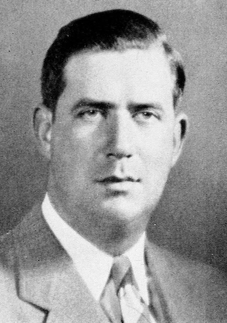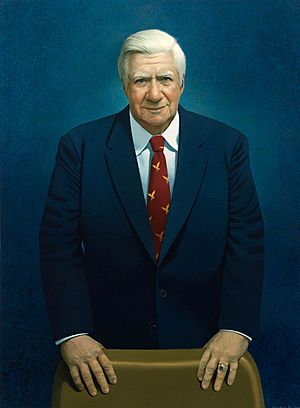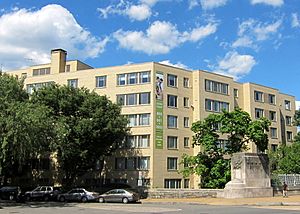Tip O'Neill facts for kids
Quick facts for kids
Tip O'Neill
|
|
|---|---|
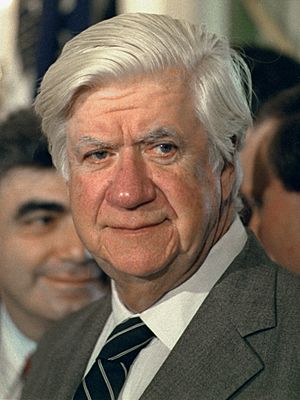
O'Neill in 1978
|
|
| 47th Speaker of the United States House of Representatives | |
| In office January 4, 1977 – January 3, 1987 |
|
| Preceded by | Carl Albert |
| Succeeded by | Jim Wright |
| Leader of the House Democratic Caucus | |
| In office January 4, 1977 – January 3, 1987 |
|
| Preceded by | Carl Albert |
| Succeeded by | Jim Wright |
| House Majority Leader | |
| In office January 3, 1973 – January 3, 1977 |
|
| Deputy | John J. McFall |
| Speaker | Carl Albert |
| Preceded by | Hale Boggs |
| Succeeded by | Jim Wright |
| House Majority Whip | |
| In office January 3, 1971 – January 3, 1973 |
|
| Leader | Carl Albert |
| Preceded by | Hale Boggs |
| Succeeded by | John J. McFall |
| Member of the U.S. House of Representatives from Massachusetts |
|
| In office January 3, 1953 – January 3, 1987 |
|
| Preceded by | John F. Kennedy |
| Succeeded by | Joseph P. Kennedy II |
| Constituency | 11th district (1953–1963) 8th district (1963–1987) |
| Speaker of the Massachusetts House of Representatives | |
| In office 1949–1953 |
|
| Preceded by | Frederick Willis |
| Succeeded by | Charles Gibbons |
| Minority Leader of the Massachusetts House of Representatives | |
| In office 1947–1949 |
|
| Preceded by | John Flaherty |
| Succeeded by | Charles Gibbons |
| Member of the Massachusetts House of Representatives from the 3rd Middlesex district |
|
| In office 1937–1953 |
|
| Personal details | |
| Born |
Thomas Phillip O'Neill Jr.
December 9, 1912 Cambridge, Massachusetts, U.S. |
| Died | January 5, 1994 (aged 81) Boston, Massachusetts, U.S. |
| Resting place | Mount Pleasant Cemetery, Harwich Port, Massachusetts, U.S. |
| Political party | Democratic |
| Spouse |
Mildred Miller
(m. 1941) |
| Children | 5, including Thomas |
| Education | Boston College (BA) |
Thomas Phillip "Tip" O'Neill Jr. (born December 9, 1912 – died January 5, 1994) was an important American politician. He served as the 47th Speaker of the United States House of Representatives from 1977 to 1987. He represented the northern part of Boston, Massachusetts, as a Democrat for many years.
Tip O'Neill was the only Speaker to serve for five full terms in a row. This makes him one of the longest-serving Speakers in American history. He was known for his strong beliefs and his ability to work with others, even those he disagreed with.
Contents
Who Was Tip O'Neill?
Early Life and Education
Thomas Phillip O'Neill Jr. was born in North Cambridge, Massachusetts. His family was Irish and lived in a middle-class area. His mother passed away when he was very young. He was mostly raised by a housekeeper until his father remarried. His father was a bricklayer who later joined the Cambridge City Council.
O'Neill got the nickname "Tip" from a Canadian baseball player named James "Tip" O'Neill. He went to Catholic schools and graduated from St. John High School in 1931. He was the captain of the basketball team there. He then went to Boston College and graduated in 1936.
Starting in Politics
O'Neill started getting involved in politics when he was just 15 years old. He helped with Al Smith's presidential campaign in 1928. Four years later, he helped Franklin D. Roosevelt's campaign.
While still in college, O'Neill ran for the Cambridge City Council but lost. This was his only election loss. From this experience, he learned a famous lesson: "All politics is local." This means that what happens in your local community is very important in politics.
In 1936, at age 24, O'Neill was elected to the Massachusetts House of Representatives. The tough economic times of the Great Depression made him a strong supporter of Roosevelt's New Deal policies. He believed the government should help people with social problems.
In 1949, he became the first Democrat to be the Speaker of the Massachusetts House of Representatives. He held this job until 1952.
Serving in the U.S. House of Representatives
In 1952, O'Neill was elected to the United States House of Representatives. He took over the seat that John F. Kennedy had left to become a Senator. O'Neill was re-elected 16 times and never faced a difficult election. His district was in the northern part of Boston.
He became a key helper for the Democratic leaders in the House, especially his mentor, John William McCormack. O'Neill supported important laws like the Civil Rights Acts of 1957, 1960, 1964, and 1968. He also voted for the Voting Rights Act of 1965.
Views on the Vietnam War
In 1967, O'Neill disagreed with President Lyndon B. Johnson about the Vietnam War. He believed the U.S. should not be involved. He wrote in his book that he felt the conflict was a civil war and that U.S. involvement was wrong. This decision helped him gain support from younger voters and college students. It also earned him the trust of younger House members who shared his anti-war views.
Rising Through the Ranks
In 1971, O'Neill became the Majority Whip in the House. This was the third-highest position for Democrats. Two years later, in 1973, he became House Majority Leader. This happened after the previous Majority Leader, Hale Boggs, disappeared.
As Majority Leader, O'Neill was a strong voice calling for the impeachment of President Richard M. Nixon because of the Watergate scandal.
Becoming Speaker of the House
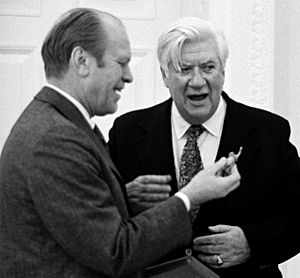
In 1977, the House Speaker, Carl Albert, retired. O'Neill was then elected Speaker. This was the same year that Jimmy Carter became president.
Working with President Carter
With many Democrats in both houses of Congress and a Democratic president, O'Neill hoped they could pass important laws. These included universal health care and programs to guarantee jobs. However, there were some disagreements between President Carter and Congress.
O'Neill and other Democratic leaders were upset when Carter threatened to stop a bill about water projects. They also didn't like some of Carter's appointments to federal jobs. O'Neill was also surprised by Carter's simple lifestyle in the White House. Carter even stopped serving strong drinks to save money. O'Neill, who liked traditional meals, joked about being served only cookies and coffee at a White House breakfast.
Carter wanted to cut government spending, but O'Neill wanted to fund projects that would help loyal Democrats. Economic problems and the Iran hostage crisis made things difficult for Carter and the Democrats in the 1980 elections.
Working with President Reagan
After the 1980 election, the U.S. Senate was controlled by Republicans. O'Neill became the main leader of the opposition to President Ronald Reagan's policies. O'Neill often spoke strongly against Reagan's ideas. He called Reagan "the most ignorant man who had ever occupied the White House."
However, O'Neill and Reagan were friendly in private. Reagan once joked that O'Neill sent him a valentine card with a "bleeding heart." This showed their friendly rivalry.
O'Neill also quietly supported Democratic Congressman Charlie Wilson in helping the Mujahideen in the Soviet-Afghan war. This was part of the Reagan Doctrine.
There was a moment of concern about who would be in charge when Reagan was shot in 1981. Secretary of State Alexander Haig said he was "in control." But it was later noted that O'Neill was next in line after the Vice President. Reagan recovered quickly, so no formal change in leadership was needed.
Helping Northern Ireland
One of O'Neill's important achievements was helping with peace in Northern Ireland. He worked with other Irish-American politicians like Hugh Carey, Edward Kennedy, and Daniel Patrick Moynihan. They were called the "Four Horsemen."
They encouraged both President Carter and President Reagan to push the British government for peace. In 1981, O'Neill also started the Friends of Ireland group to promote peace. In 1986, the Republic of Ireland made O'Neill an honorary Irish citizen.
Life After Being Speaker
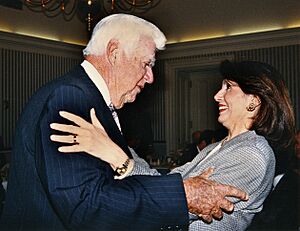
After leaving Congress in 1987, O'Neill wrote his autobiography, Man of the House. The book was very popular and became a national best-seller. O'Neill also appeared in several commercials and other media.
In 1987, he received the Freedom Medal. On November 18, 1991, President George H. W. Bush gave him the Presidential Medal of Freedom.
O'Neill had colon cancer. He made public service announcements about cancer, joining athletes and movie stars to talk openly about their experiences with the disease.
Personal Life and Family
O'Neill lived in North Cambridge, Massachusetts. He also had a vacation home in Harwich Port, Massachusetts. His wife was Mildred "Millie" Anne Miller. They had five children. His oldest son, Thomas P. O'Neill III, was a former lieutenant governor of Massachusetts.
In 1980, O'Neill received the Laetare Medal from the University of Notre Dame. This is a very respected award for American Catholics.
Death and Legacy
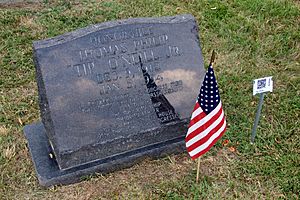
Tip O'Neill passed away from a heart attack on January 5, 1994, in Boston. He was 81 years old. President Bill Clinton praised him, saying O'Neill was a strong supporter of working people. He loved politics because he believed it could make a difference in people's lives.
Many places and buildings are named after Tip O'Neill. These include the Thomas P. O'Neill Jr. Tunnel in downtown Boston, a House Office Building, and a library in Cambridge. His alma mater, Boston College, also named its main library after him.
In 2008, a play called According to Tip opened. It was a one-man show where O'Neill told stories about his life. In 2012, the John F. Kennedy Presidential Library and Museum held an event to celebrate 100 years since O'Neill's birth.
Books
- O'Neill, Thomas P.; Novak, William (1987). Man of the House: The Life and Political Memoirs of Speaker Tip O'Neill. ISBN 978-0-394-56505-7.
- O'Neill, Thomas P.; Hymel, Gary (1994). All Politics Is Local and Other Rules of the Game. Holbrook, Mass.: Bob Adams, Inc.. ISBN 9781558504707. OCLC 1042095400. https://archive.org/details/allpoliticsisloc0000onei/page/n7/mode/2up.
 | Emma Amos |
 | Edward Mitchell Bannister |
 | Larry D. Alexander |
 | Ernie Barnes |


